- If at first the idea is not absurd, then there is no hope for it.
— Albert Einstein (1879–1955), German-born Physicist & Philosopher, Author of Out of My Later Years - Every time you meet somebody, you’re looking for a better and newer and bigger idea. You are open to ideas from anywhere.
–Jack Welch (b. 1935), American Business Executive & Author of Jack: Straight From The Gut and Winning .jpg) The man with a new idea is a crank until the idea succeeds.
The man with a new idea is a crank until the idea succeeds.
–Mark Twain (1835–1910), American Author & Humorist, Author of Adventures of Huckleberry Finn- The rewards in business go to the man who does something with an idea.
–William Benton (1900–73), American Publisher, Businessman, Politician - Try this for a week: Each morning, spring out of bed at the first hint of light and focus first on the new and wondrous things that are just waiting to reveal themselves that day. Let curiosity well up inside of you. Let your mind open up to new ideas. Forget that you already know everything.
–Donna Kinni (b. 1961), American Author - The creative person wants to be a know-it-all. He wants to know about all kinds of things: ancient history, nineteenth-century mathematics, current manufacturing techniques, flower arranging, and hog futures. Because he never knows when these ideas might come together to form a new idea. It may happen six minutes later or six months or six years down the road. But he has faith that it will happen.
–Carl Ally (1924–99), American Advertising Executive - When it comes to organizational imagination, everyone is a point of light, inwardly afire with excellent ideas for making our companies work smarter, faster, leaner, and better. But as business leaders, we too seldom tap into our most valuable resource—the brain trust of our employees—to discover new pathways of progress and profits.
–Charles Decker (1961–2012), American Publisher - Inventors and men of genius have almost always been regarded as fools at the beginning (and very often at the end) of their careers.
–Feodor Dostoyevsky (1821–81), Russian novelist, Author of Crime and Punishment - Ideas are like rabbits. You get a couple and learn how to handle them, and pretty soon you have a dozen.
–John Steinbeck (1902–68), American Novelist and author of Of Mice and Men .jpg) Keep on the lookout for novel ideas that others have used successfully. Your idea has to be original only in its adaptation to the problem you’re working on.
Keep on the lookout for novel ideas that others have used successfully. Your idea has to be original only in its adaptation to the problem you’re working on.
–Thomas Edison (1847–1931), American Inventor- No idea is so antiquated that it was not once modern. No idea is so modern that it will not someday be antiquated.
–Ellen Glasgow (1873–1945), American Novelist, Author of In This Our Life - To stay ahead, you must have your next idea waiting in the wings.
–Rosabeth Moss Kanter (b. 1942), American Academic, Author of Challenge of Organizational Change - Brainpower is now the greatest commodity we can contribute to the world. Democracy was never intended to be a breeding place for mediocrity. We must engage in the business of stimulating brainpower lest we fail in producing leaders of consequence. In a period of speed, space and hemispheric spasms we dare not treat new thoughts as if they were unwelcome relatives.
–Dean F. Berkley (1925–2009), American Academic - If you do not express your own original ideas, if you do not listen to your own being, you will have betrayed yourself. Also, you will have betrayed your community in failing to make your contribution.
–Rollo May (1909–94), American Psychologist - New ideas come from differences. They come from having different perspectives and juxtaposing different theories.
–Nicholas Negroponte (b. 1943), Greek-American Architect - Invention is the process by which a new idea is discovered or created. In contrast, innovation occurs when a new idea is adopted.
–Everett Rogers (1931–2004), American Sociologist - The best way to have a good idea is to have a lot of ideas.
–Linus Pauling (1901–94), American Scientist - Ideas are a capital that bears interest only in the hands of talent.
–Antoine de Rivarol (1753–1801), French Journalist - The power of an idea can be measured by the degree of resistance it attracts.
–David Yoho (b. 1946), American Business Consultant - An idea is salvation by imagination.
–Frank Lloyd Wright (1869–1959), American Architect and author of The Natural House .jpg) Daring ideas are like chessmen moved forward. They may be beaten, but they may start a winning game.
Daring ideas are like chessmen moved forward. They may be beaten, but they may start a winning game.
–Johann Wolfgang von Goethe (1749–1832), German Poet & Statesman, Author of Maxims and Reflections- If you can dream it, you can do it.
–Walt Disney (1901–66), American Entrepreneur & Entertainer - There is no prosperity, trade, art, city, or great material wealth of any kind, but if you trace it home, you will find it rooted in a thought of some individual man.
–Ralph Waldo Emerson (1803–82), American Philosopher and Essayist, Author of Self-Reliance - A great idea is usually original to more than one discoverer. Great ideas come when the world needs them. Great ideas surround the world’s ignorance and press for admission.
–Elizabeth Stuart Phelps (1844-1911), American Author of A Singular Life and other books - I’d climb into the car as it went down the assembly line and introduce myself. Then I’d ask for ideas.
–John Risk, American Automotive Engineer
Category: Education and Career
Bill Gates on Malcolm Gladwell’s 10,000 Hour Rule
 It’s a tempting proposal: if you practice anything for 10,000 hours, then you will become world class. In 1993, scientist Anders Ericsson learned of a group of psychologists in Berlin who were researching violin players found that, by age 20, the leading performers had averaged in excess of 10,000 hours of practice each. Less able performers, in the meantime, clocked up just 4,000 hours. Malcolm Gladwell popularized the notion further in his book Outliers: The Story of Success.
It’s a tempting proposal: if you practice anything for 10,000 hours, then you will become world class. In 1993, scientist Anders Ericsson learned of a group of psychologists in Berlin who were researching violin players found that, by age 20, the leading performers had averaged in excess of 10,000 hours of practice each. Less able performers, in the meantime, clocked up just 4,000 hours. Malcolm Gladwell popularized the notion further in his book Outliers: The Story of Success.
In study after study, of composers, basketball players, fiction writers, ice-skaters, concert pianists, chess players, master criminals,” writes the neurologist Daniel Levitin, “this number comes up again and again. Ten thousand hours is equivalent to roughly three hours a day, or 20 hours a week, of practice over 10 years… No one has yet found a case in which true world-class expertise was accomplished in less time. It seems that it takes the brain this long to assimilate all that it needs to know to achieve true mastery.
Gladwell applied the concept to Bill Joy, Bill Gates, and the Beatles, who sharpened their musical know-how in performance at Hamburg’s strip clubs. Gladwell says:
The Beatles ended up travelling to Hamburg five times between 1960 and the end of 1962. On the first trip, they played 106 nights, of five or more hours a night. Their second trip they played 92 times. Their third trip they played 48 times, for a total of 172 hours on stage. The last two Hamburg stints, in November and December 1962, involved another 90 hours of performing. All told, they performed for 270 nights in just over a year and a half. By the time they had their first burst of success in 1964, they had performed live an estimated 1,200 times, which is extraordinary. Most bands today don’t perform 1,200 times in their entire careers. The Hamburg crucible is what set the Beatles apart.
.jpg) Coined by Florida State psychologist Anders Ericsson and made famous by Malcolm Gladwell in his book Outliers, the 10,000 hour rule reflects the belief that becoming a superlative athlete or performer rests on a long period of hard work rather than “innate ability” or talent. As stated by Malcolm Gladwell’s famous 10,000-hour rule, genuine success only comes to people who are willing to put in a great many hours to become first-class at something they value. Whether it involves learning a new piece of equipment, a new language, or developing a craft, being able to cope with setbacks and stay focused on goals regardless of how far-flung they seem. And so the importance of resolve and steadiness in success.
Coined by Florida State psychologist Anders Ericsson and made famous by Malcolm Gladwell in his book Outliers, the 10,000 hour rule reflects the belief that becoming a superlative athlete or performer rests on a long period of hard work rather than “innate ability” or talent. As stated by Malcolm Gladwell’s famous 10,000-hour rule, genuine success only comes to people who are willing to put in a great many hours to become first-class at something they value. Whether it involves learning a new piece of equipment, a new language, or developing a craft, being able to cope with setbacks and stay focused on goals regardless of how far-flung they seem. And so the importance of resolve and steadiness in success.
Bill Gates did not only have an propensity for creating software, he also had just about exceptional access as a schoolboy to a mainframe computer that the parents’ association of his local school invested in, in 1968. He got to it in eighth grade before just about anyone else in the world. Correspondingly the Beatles’ genius for melody did not come ready made. They developed it while singing in Hamburg in the early Sixties, at all-night strip clubs. In those years they dedicated more time to pop music than any of their peers. The same could be said for Mozart, or Tiger Woods. They had capability, sure enough, but they also had extraordinary family circumstances that allowed them a reasonable advantage at a very early age. They put the hours in first.
Extraordinary success depends on talent, hard work, and being in the right place at the right time, among other things. In Outliers, Gladwell contends that, to truly master any skill, leaning on various pieces of research, requires about 10,000 concentrated hours. If you can get those hours in early, and be in a position to exploit them, then you are an outlier.
When asked, “What do you think of Malcolm Gladwell’s theory that the years 1953 to 1955 were the perfect ones in which to be born for the computer revolution?” by his father William H. Gates Sr., Bill Gates reponds:
His book makes a lot of great points … that is that in all success stories there are significant elements of luck and tiny … I wasn’t the only kid born between 1953 and 1955, but absolutely to be young and open-minded at a time when the microprocessor was invented … in my case have a friend Paul Allen who was more open-minded about hardware type things and literally brought me the obscure article to talk about that first microprocessor and said you know this is going to improve exponentially … what does that mean and I said well at that means it we can do anything we want and then he was … you know … bugging me the rest of the time every time there’d be a new microprocessor he said can we do something yet and when we were in high school that can happen … so he came back to possible good job there and actually the microprocessor that was finally good enough came out in early 1975 and that’s why I i dropped out … so the timing was pretty important you know why didn’t older people see it … they weren’t this open open minded … they didn’t think about software is the key ingredient … now a lot of kids started doing software and … it’s not if somebody reads the book to say that if you spend 10,000 hours doing something you’ll be super good at it I don’t think that’quite as simple as that what you do is you do about 50 hours and ninety percent drop out because they don’t like it or they’re not good … you do another 50 hours and ninety percent drop out … so there’s these constant cycles and you do have to be lucky enough but also fanatical enough to keep going and so the person makes it to 10,000 hours is not just somebody has done it for 10,000 hours there’s somebody who chosen and been chosen in many different times and so all these magical things came together including who I know and that time … and i think you know that’s very important … when you look at somebody who’s good and say could I do it like them … they’ve gone through so many cycles that it may fool you that you know yes yes you could with the with the right luck, imagination, and and some some talent.
Bill Gates responds to Malcolm Gladwell’s theory that it takes 10,000 hours of deliberate practice to master a skill. Apart from acknowledging luck, timing and an open mind, Gates suggests that a successful person survives many cycles of attrition to make it to 10,000 hours of experience. “You do have to be lucky enough, but also fanatical enough to keep going,” explains Gates.
Unfortunately, a Princeton study, which analyzed 88 studies, established that practice accounted for just a 12% variation in performance.
How to Prepare Yourself for Future Opportunities

Chance favors the prepared mind. “The prepared mind” is the characteristic of leaders who are outstanding in their talent to perceive, make sense, decide and act across a complex set of conditions. We also believe that “the prepared mind” is not a matter of chance. It is a matter of intentional preparation that requires developing eight mental skills regardless of your role.
How will you prepare for your tomorrow?
- You need the skill of observing because your world is more competitive. Execution-driven leaders often become so consumed by the pressures of running their projects and their organizations that they never pause to take a look at what’s going on around them. You may have mastered the core capabilities of your profession, and yet new technology might make these capabilities obsolete. List the capabilities you need to develop. Find a meaningful unifying purpose.
- You need the skill of reasoning because you need to reevaluate your assumptions. Data are useless without the skills to analyze them, reason, and make meaning of them. For example, are you thinking big enough? Take your situation and think bigger. Reasoning can complement problem-solving skills that you already have with a methodical approach to use with moral, ethical, organizational, or technical problems.
- You need the skill of imagining because you need alternatives to keep yourself sharp. Imagination is not a trait that we inherit in our genes or a blessing bestowed by the angels. It’s a skill. Be curious about everything—the world is full of amazing wonders for you to learn about. Creativity is at the heart of innovation. To improve this skill, list three combinations that would create something new and useful for you. Name one thing that you think you are too old to start. Are you really too old?
- You need the skill of challenging because expertise breeds conservatism. Challenging a group’s willingness to go with the first right answer can be major barrier to unleashing full creative potential. To improve the skill of challenging, list the constraints imposed on you. Who has already dealt with them? What did they do? What could you do?
- You need the skill of learning because new opportunities abound. Improved learning skills—concentrating, reading, and listening, remembering, using time, and more—are directly useful and will continue to pay dividends for a long time. What don’t you know that you should? List technologies, practices, or events that might provide insight. Learn about the future by studying some history. Also, list some mistakes or failures from your past. What did you learn from them?
- You need the skill of deciding because every decision has consequences, and no decision is a decision. Every solution brings about its own set of new problems. No leader knows enough about the future to make the most favorable decision every time, but it’s better to set a clear direction today and confront problems that crop up tomorrow. It’s not being afraid to fail; and if you do, identify it quickly and more ahead fast so no momentum is lost.
- You need the skill of enabling because all of us are smarter than any one of us, and “they” need the knowledge, means, and opportunity to help you reach your goals. Who needs your help, and how can they help you? Provide opportunities—delegate. Ensure that outcomes, actions and questions are properly recorded and actioned, and appropriately dealt with afterwards.
- You need the skill of reflecting because you learn more from understanding the reasons for your success and failure than you do from studying someone else’s best practices. Take a current problem and list possible answers. Now think like a beginner by asking dumb questions. Reflect on those questions and answers. The greatest strength of reflective leaders is their thoughtful and attentive nature, which means tremendous persistence to listen and take in information, the ability to connect the dots and garner eye-opening insights, and deep trust in their instinct, creativity, and thinking process.
Many leaders seem so besieged with their current workload that telling they prepare for the future may seem unreasonable. By preparing today to meet tomorrow’s challenges, they can set in motion a new leadership paradigm, one that will help leaders better cope with today.
Prepare your mind and then use your mind wisely. Leaders who focus on those eight basics will be prepared to encounter the unknowable challenges that lie ahead.
Advantages and Disadvantages of Using Various Research Methods

Experimental Method
Advantages of Experimental Method:
- Precise control possible
Disadvantages of Experimental Method:
- Artificial setting typical
- Causal conclusions possible
- Intrusiveness typically high
- Precise measurement possible
- Complex behaviors difficult to measure
- Theory testing possible
- Unstructured exploratory research difficult
Correlational Observation
Advantages of Correlational Observation:
- Relationships between variables can be found
Disadvantages of Correlational Observation:
- Causal conclusions impossible
- Precise measurement usually possible
- Control of variables difficult
- Intrusiveness usually low
- Many participants required
Ethnography
Advantages of Ethnography:
- Unfamiliar situations can be described
Disadvantages of Ethnography:
- Control of variables impossible
- Complex behaviors can be described
- Precise measurement difficult
- Intrusiveness low
- Investigator bias possible
- Participants treated humanistically
- Causal conclusions impossible

Questionnaires
Advantages of Questionnaires:
- Data collection efficient
Disadvantages of Questionnaires:
- Causal conclusions impossible
- Attitude or opinion can be measured
- Self-reports difficult to verify
- Unbiased sample selection difficult
- Response rates low when mailed
Naturalistic Observation
Advantages of Naturalistic Observation:
- Realistic setting helps generalization
Disadvantages of Naturalistic Observation:
- Control of variables impossible
- Intrusiveness low
- Data collection inefficient
- Investigator bias possible
Archival Research
Advantages of Archival Research:
- No additional data collection required
Disadvantages of Archival Research:
- Causal conclusions impossible
- Rare behaviors can be studied
- Appropriate records often not available
- Nonmanipulable events can be studied
- Data collected by nonscientists
- Data usually correlational at best
Case History
Advantages of Case History:
- Rare cases can bestudied
Disadvantages of Case History:
- Control of variables impossible
- Complex behavior can be intensively studied
- Data often based on fallible memories
- Investigator bias highly likely
- Causal conclusions impossible
Books on Science Recommended by Investor Mohnish Pabrai (Pabrai Funds)

Mohnish Pabrai is an investor, hedge-fund manager and philanthropist. Mohnish manages Pabrai Funds and leads the Dakshana Foundation, a tutoring service in India for less-privileged members of the society to enable them to attend the elite institutions of higher learning in India.
.jpg) “Meaning of It All: Thoughts of a Citizen Scientist” by Richard P. Feynman
“Meaning of It All: Thoughts of a Citizen Scientist” by Richard P. Feynman- “The Lunar Men: Five Friends Whose Curiosity Changed the World” by Jenny Uglow
- “Linked: How Everything Is Connected to Everything Else and What It Means” by Albert-Laszlo Barabasi
- “Genius: The Life and Science of Richard Feynman” by James Gleick
- “The Blank Slate: The Modern Denial of Human Nature” by Steven Pinker
- “Wider than the Sky: The Phenomenal Gift of Consciousness” by Gerald M. Edelman
- “Jump Start Your Brain” by Doug Hall
.jpg) “A Short History of Nearly Everything” by Bill Bryson
“A Short History of Nearly Everything” by Bill Bryson- “The Expanded Quotable Einstein” by Freeman Dyson
- “The Feynman Tapes, Volume 1 (Chief Research Chemist and other stories)” by by Richard P. Feynman
- “The Visionary Window: A Quantum Physicist’s Guide to Enlightenment” by Amit Goswami, Deepak Chopra
- “The Progress Paradox: How Life Gets Better While People Feel Worse” by Gregg Easterbrook
- “How the Mind Works” by Steven Pinker
- “Descartes’ Error: Emotion, Reason, and the Human Brain” by Antonio R. Damasio
- “A Matter of Degrees: What Temperature Reveals About the Past and Future of Our Species, Planet, and Universe” by Gino Segre
.jpg) “Surely You’re Joking, Mr. Feynman!: Adventures of a Curious Character” by Richard P. Feynman
“Surely You’re Joking, Mr. Feynman!: Adventures of a Curious Character” by Richard P. Feynman- “Synaptic Self: How Our Brains Become Who We Are” by Joseph Ledoux
- “The Meaning of It All: Thoughts of a Citizen Scientist” by Richard P. Feynman
- “Consilience: The Unity of Knowledge” by Edward O. Wilson
- “Isaac Newton” by James Gleick
Conducting Behavioral Assessments: Advantages

Behavioral assessments ask specific questions focused on target behaviors. Behavioral assessments are interested in samples of behavior and not behavior as a sign of internal processes. The responses collected from behavioral assessments can be interpreted as samples of a person behavior that are thought to generalize to other situations that the person might be subject to.
Overall, data and information resulting from behavioral assessments may have numerous advantages over data and information derived by traditional assessments or other methods of assessments. Data derived from behavioral assessments can be used:
- to present behavioral baseline data with which other behavioral data (gathered after the passage of time, after a particular intervention, or after some other event) can be compared
- to make available a record of the subject’s behavioral strengths and weaknesses across a assortment of situations, circumstances, and settings that the subject can be exposed to
- to identify and pin down environmental circumstances that act to trigger, maintain, or extinguish certain behaviors in the subject
- to identify and target precise behavioral patterns in a subject for modification through clinical or psychological interventions
- to produce graphic displays that can be used to encourage inventive methods of treatment or more effective clinical or psychological therapy methods
The level of training and the experience of assessors influence the validity and reliability of behavioral assessments. Also affecting the soundness of the behavioral interviews is the ability to generalize the observations to other subjects, settings, and situations.
The Best Tweets by Career Coach Marty Nemko: Life Lead Well & Career Success

Marty Nemko is an Oakland, CA-based career coach, and author. Marty hosts the “Work with Marty Nemko” on KALW-FM, an NPR-San Francisco station.
.jpg) Marty Nemko blogs about career, education, men’s and boys’ issues, the life well-led, and improving the world at martynemko.blogspot.com/. A compilation of his articles and writings are at www.martynemko.com/. His YouTube channel is at www.youtube.com/user/mnemko.
Marty Nemko blogs about career, education, men’s and boys’ issues, the life well-led, and improving the world at martynemko.blogspot.com/. A compilation of his articles and writings are at www.martynemko.com/. His YouTube channel is at www.youtube.com/user/mnemko.
Marty also published a compilation of his articles in newspapers, blogs, magazines, and on his website in book chock full of wisdom: ‘How to Do Life: What they didn’t teach you in school’.
Here are the very best of Marty Nemko’s tweets from his @MartyNemko handle.
- “I even take care to tear-off single sheets of toilet paper. Because I’m cheap? No. Because it’ll help the environment? No. I just think wasting is wrong.”
- “If you relentlessly pursue a big goal with laser-beam focus, you will likely like your life and be a most worthy person.”
- “Where at all ethically possible, we must give others hope. Without it, a person figuratively or even literally dies.”
- “Exploring what your parents did to you may provide insight but, often, your life is no better. It just legitimizes your malaise, maybe even increases your stuckness..”
- “Facing our parents’ aging forces us to confront our own mortality. It reminds us to appreciate and live each moment wisely.”
- “Keep it simple: Reasonable diets all distill to: Lots of vegetables and legumes, some fruit, and small portions of everything else.”
- “Be kind where you can, tough where you should.”
- “If you have a clearly good idea, to avoid getting talked out of it, get input only on how to better execute it.”
- “As we age, we may accrue a creeping bitter wisdom.”
- “Telling people I can’t lose weight may make me eat more—to prove myself right. Perhaps if I told people, “‘I’m gonna lose 20.'””
- “There’s cost and benefit each time you criticize or suggest. Sometimes, it’s worth the price. Make the choice consciously.”
- “That a partner ‘gets’ you, this is what above all cements love: love as accurate (but still benevolent) interpretation.”
- “A desire to “give back” needn’t imply giving to the neediest. It could mean giving to those with the most potential to benefit.”
- “We dun perfectionism, e.g., as causing procrastination. Yet haven’t your perfectionist efforts yielded the most good & satisfaction?”
- “A mantra to cure procrastinators: It needn’t be perfect; it needn’t be fun; it just has to get done.”
- “Far better than a course is self-study + a tutor to get you past your trouble spots.”
- “Far more of life’s pleasures are in the process than in the outcome. Be in the moment.“
- “Whatever bad awaits, don’t let it spoil the present moment.”
- “Scratch the surface of any thinking ideologue and you’ll find doubts. Ask, “Ever wondered whether the other side might be right?””
- “Might you be wise to focus more on self-acceptance than self-improvement? That might even motivate you to self-improve.”
- “More than a little “processing” of past bad experiences is often counterproductive.”
- “No matter how brilliant you are, if your style is too intense, most people will dismiss you.”
- “It’s easy to be liked: listen more than talk, praise often, and disagree rarely. The question is, is it worth the loss of integrity? “
- “Long-winded? Constantly ask yourself, “Does the person really need & want to know this phrase?” And keep utterances to <30 sec.”
- “I used to think most people are intrinsically motivated to work hard. But I’m finding that many if not most people need monitoring.”
- “The key to a well-led life is maxing your contribution. Happiness, less key, is most likely found in simple pleasures.”
- “How feeble are we that we’re swayed more by dubious flattery than by valid suggestions.”
- “Key to being liked: While retaining integrity, do more agreeing, amplifying, empathizing. do less arguing, one-upping, yes-butting.”
- “Why do so many people prefer a silly, manipulative, games-playing, selfish hottie over an ugly, intense, honest, kind person?”
- “It all comes down to this: Do good.“
- “You’ll likely learn more of enduring value from an hour of wise googling than from any course.”
- “Part of getting older may mean having to accept that we may not make as big a difference in the world as we had hoped.”
- “For many people, before age 60, it’s business before pleasure. After 60, pleasure before business.”
- “To boost self-esteem: accept you’re flawed like everyone, do what you’re good at, & accomplish: Even little wins boost self-esteem.”
- “A clue to what career or avocation you should pursue is to inventory how you actually spend your discretionary time.”
- “If you’ve been beaten up in Rounds 1-9, it’s hard to come out for Round 10.”
- “It’s hard to change people’s work style: aggressive vs passive, hardworking vs moderate. So it may be wise to praise their status-quo.”
- “Many people can do well in school, even get PhDs, yet are unhireable in the real world. The degree is US’s most overrated product.”
- “A resume rarely helps—it’s too filled with chemistry-inhibiting cliche. Write & tell the “resume” that’d reveal your true story & self.”
- “Be tough where you must be, kind where you can be.”
- “You can do everything right and still fail, not just once, but overall in life. Luck is more important than we acknowledge.”
- “A clue to what career you should pursue: When you’re really comfortable, what do you love to talk about?”
- “If you want to lock in a new attitude or behavior, say and/or write that and why. Then keep paraphrasing, NOT reading it.”
- “Before making an argument, ask a likely opponent to lay out the counterargument. Your argument can then incorporate that.”
- “In your desire to stand out from the horde, beware of hyping yourself, your ideas, or taking inappropriately extreme positions.”
- “Giving advice makes the recipient feel less efficacious, so weigh that against the benefit your advice will likely yield.”
- “Unefficacious people can’t or CHOOSE TO not bounce back—it’s a good excuse to avoid facing their inefficacy yet again.”
- ” Teamwork is deified. Don’t forget the pluses of individualism: more motivation, bolder/less compromised solutions, speed.”
- “When overwhelmed, after doing any needed planning, just stay in the moment and put one foot in front of the other.”
- “If your self-esteem is low, perhaps focus on finding work you can succeed at. Real self-esteem comes from accomplishment.”
- “If someone smiles at you with pursed lips, they’re generally forcing the smile—either because they’re shy or don’t like you.”
- “Wasting money on designer labels is so 20th-century. It’s a permanent loss of money in exchange an evanescent feel-good.”
- “Don’t confuse tact with cowardice. Sometimes, it’s wise to speak up boldly.”
- “Talking too much is a career killer. Keep all utterances to less than 45 seconds &, in dialogue, speak a bit LESS than 50% of the time.”
- “School can give a false sense of confidence or of loserhood. Too often, school success does not predict life success.”
- “Your goal must not be to impress but to accomplish. That usually demands bringing out the best in others.
- “Just because you CAN prove someone wrong, doesn’t mean you should.”
- “I fear we’ll make everything equal until everyone has nothing.”
- “To boost motivation: what’s your next 1-second task? It feels good to get even a tiny task done, make progress, and maybe learn something.”
- “To disagree without creating enmity: “I can see why you’d X. (explain.) And (not but) I’m wondering if Y. What do you think?””
- “In managing & parenting, praise when you can, & when you can’t, try invoking guilt, e.g., “I know you’re better than this.””
- “The most powerful motivator may not be fear—people go back to bad habits after a heart attack. Could it be proving themselves right?”
- “As we age, there’s a creeping bitter wisdom we accrue.”
- “When you think you can nail someone with your argument, take a breath & see if you can phrase it as a face-saving question.”
- “Some people are nice as a way of compensating for their not being good.”
- “If possible, slightly under-schedule yourself. That gives you the time to make your work higher-quality.”
- “Ever get tired of being nice? Tempted to throw caution to the wind and say what you really think? If deserved, even yell? “
- “Winners do not let themselves succumb to anything. They distract themselves by immersing themselves in their most engaging work.”
- “Good conversationalists choose a topic that enables each participant to contribute. “
- “It worked for me, it can work for you books aren’t helpful because typical readers are less smart & driven than book authors.”
- “To broaden your horizons, mix with people other than people from your own background (professional, cultural, social, academic, racial, ethnic, etc.) Most people prefer the company of other people from similar backgrounds. Birds of a feather do flock together.”
- “Most of us think ourselves bold, individualistic thinkers when in fact we’re tepid if not downright lemmings.”
- “Good, simple conversation starter, “What’s doing in your life?” or “Whatcha been thinking about these days?””
- “What skill of yours has given you the must success? Use it more.”
- “The most valuable way to spend a dollar? A memo pad. Keep it with you at all times. Think of ideas. Write them down. Implement them.”
- “Successful, productive people fuel themselves with their work & accomplishment, unsuccessful people through recreation.”
- “The desire to be right usually trumps the desire for truth.”
- “The only God resides within us: It is our our wisest attitudes and actions.”
- “We hear stories of persistence rewarded yet for each of those, hundreds have pressed on only to end up broken and/or broke.”
- “If the risk/reward ratio of taking an action is good, even if you may fail, it’s usually wise to follow Nike’s advice: Just do it!”
- “Sometimes, a problem has both a rational and an irrational component. It may help to try to solve those separately.”
- “People see counselors when they could journal on their own. People take classes when they could read on their own. Why? They’re forced to act.”
- “Don’t give up prematurely. Your continued efforts will iterate, improve based on lessons learned from your past failures.”
A Comprehensive List of Books Authored by Management Guru Peter F. Drucker
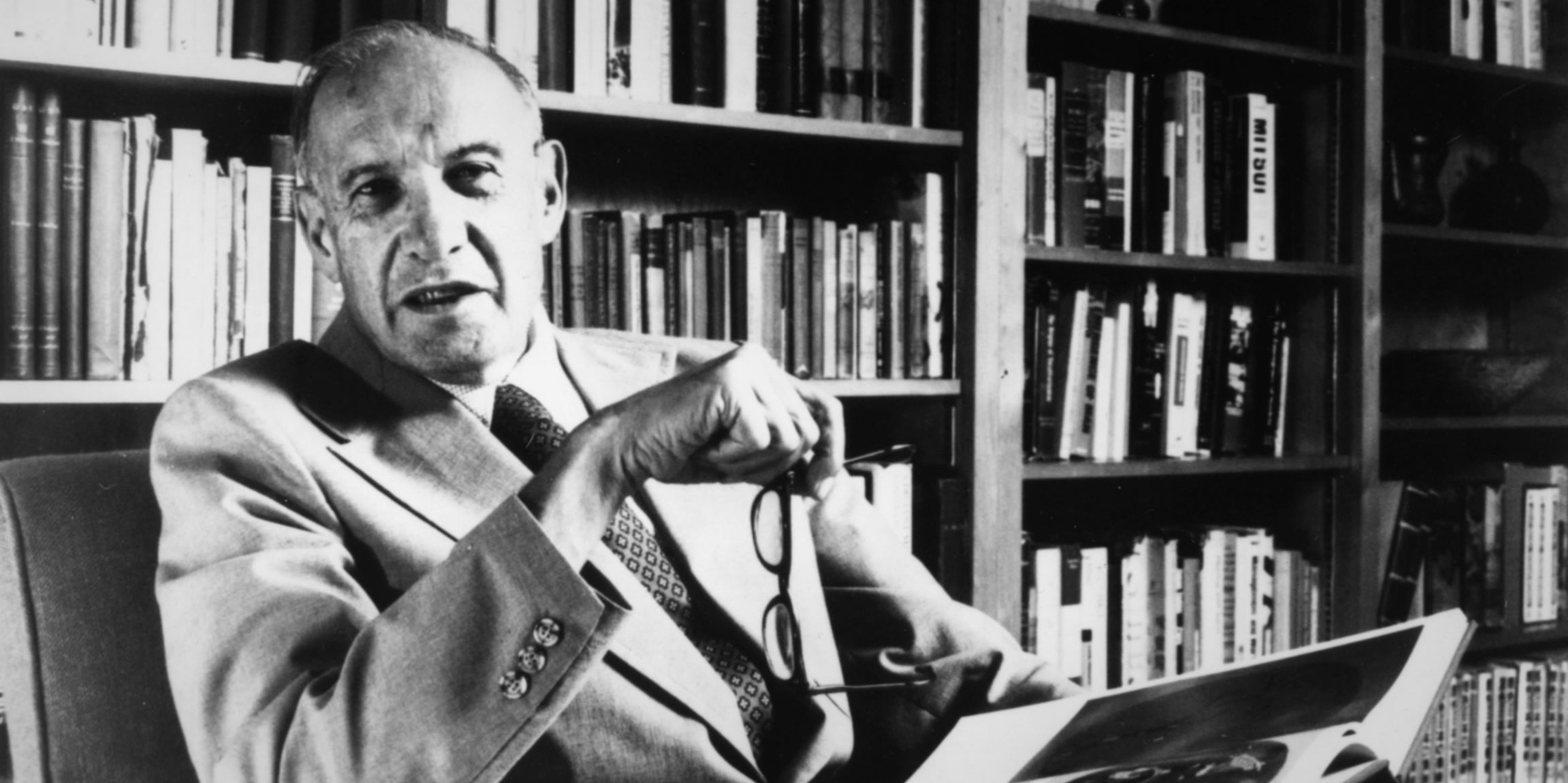
Famed management guru Peter Ferdinand Drucker spent his life contemplating and writing about how business interests, politics, and human nature interact at companies, non-profits, and governments all over the world. His consultations had an almost legendary reputation in business circles.
Peter Drucker wrote influential works about management since the 1940s. He has written about 30 books, and from 1975 to 1995 he was an editorial columnist for the Wall Street Journal.
Books by Peter F. Drucker
“The End of Economic Man” (1939)
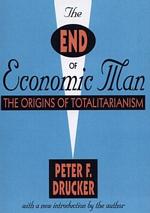 The End of Economic Man is Drucker’s first full-length book. It is a diagnostic study of the totalitarian state and the first book to study the origins of totalitarianism. He describes the reasons for the rise of fascism and the failures of established institutions that led to its emergence. Drucker develops an understanding of the dynamics of the totalitarian society and helps us to understand the causes of totalitarianism in order to prevent such a catastrophe in the future. Developing social, religious, economic, and political institutions that function effectively will prevent the emergence of circumstances that frequently encourage the totalitarian state.
The End of Economic Man is Drucker’s first full-length book. It is a diagnostic study of the totalitarian state and the first book to study the origins of totalitarianism. He describes the reasons for the rise of fascism and the failures of established institutions that led to its emergence. Drucker develops an understanding of the dynamics of the totalitarian society and helps us to understand the causes of totalitarianism in order to prevent such a catastrophe in the future. Developing social, religious, economic, and political institutions that function effectively will prevent the emergence of circumstances that frequently encourage the totalitarian state.
Buy “The End of Economic Man” by Peter Drucker
“The Future of Industrial Man” (1942)
 Drucker describes the requirements for a functioning society by developing a social theory of society in general and of the industrial society in particular. In The Future of Industrial Man, Peter Drucker presents the requirements for any society for it to be both legitimate and functioning. Such a society must give status and function to the individual. The book addresses the question: “How can individual freedom are preserved in an industrial society in light of the dominance of managerial power and the corporation?” Written before the entrance of the U.S. into World War II, it is optimistic about post-World War II Europe and reaffirms its hopes and values through a time of despair. The book dared to ask, “What do we hope for the postwar world?”
Drucker describes the requirements for a functioning society by developing a social theory of society in general and of the industrial society in particular. In The Future of Industrial Man, Peter Drucker presents the requirements for any society for it to be both legitimate and functioning. Such a society must give status and function to the individual. The book addresses the question: “How can individual freedom are preserved in an industrial society in light of the dominance of managerial power and the corporation?” Written before the entrance of the U.S. into World War II, it is optimistic about post-World War II Europe and reaffirms its hopes and values through a time of despair. The book dared to ask, “What do we hope for the postwar world?”
Buy “The Future of Industrial Man” by Peter Drucker
“Concept of the Corporation” (1946)
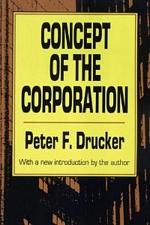 This classic book is the first to describe and analyze the structure, policies, and practices of a large corporation, General Motors. The book looks upon a “business” as an “organization,” that is, as a social structure that brings together human beings in order to satisfy economic needs and the wants of a community. It establishes the “organization” as a distinct entity, and management of an organization as a legitimate subject of inquiry. The book represents a link between Drucker’s first two books on society and his subsequent writings on management. Detailed information is provided regarding such management practices as decentralization, pricing, and the roles of profits and of labor unions. Drucker looks at General Motors’ managerial organization and attempts to understand what makes the company work so effectively. Certain questions are addressed, such as: “What are the company’s core principles, and how do they contribute to the success of the organization?” The principles of organization and management at General Motors described in this book became models for organizations worldwide. The book addresses issues that go beyond the borders of the business corporation, and considers the “corporate state” itself.
This classic book is the first to describe and analyze the structure, policies, and practices of a large corporation, General Motors. The book looks upon a “business” as an “organization,” that is, as a social structure that brings together human beings in order to satisfy economic needs and the wants of a community. It establishes the “organization” as a distinct entity, and management of an organization as a legitimate subject of inquiry. The book represents a link between Drucker’s first two books on society and his subsequent writings on management. Detailed information is provided regarding such management practices as decentralization, pricing, and the roles of profits and of labor unions. Drucker looks at General Motors’ managerial organization and attempts to understand what makes the company work so effectively. Certain questions are addressed, such as: “What are the company’s core principles, and how do they contribute to the success of the organization?” The principles of organization and management at General Motors described in this book became models for organizations worldwide. The book addresses issues that go beyond the borders of the business corporation, and considers the “corporate state” itself.
Buy “Concept of the Corporation” by Peter Drucker
“The New Society – The Anatomy of Industrial Order” (1950)
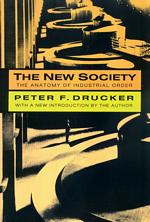 In The New Society, Peter Drucker extends his previous works The Future of Industrial Man and Concept of the Corporation into a systematic, organized analysis of the industrial society that emerged out of World War II. He analyzes large business enterprises, governments, labor unions, and the place of the individual within the social context of these institutions. Following publication of the of The New Society, George G. Higgins wrote in Commonweal, “Drucker has analyzed, as brilliantly as any modern writer, the problems of industrial relations in the individual company or ‘enterprise.’ He is thoroughly at home in economics, political science, industrial psychology, and industrial sociology, and has succeeded admirably in harmonizing the findings of all four disciplines and applying them meaningfully to the practical problems of the ‘enterprise.’ Drucker believes that the interests of the worker, management, and corporation are reconcilable with society. He advances the idea of “the plant community” in which workers are encouraged to take on more responsibility and act like “managers.” He questions whether unions can survive in their present form if the worker is encouraged to act as a manager.
In The New Society, Peter Drucker extends his previous works The Future of Industrial Man and Concept of the Corporation into a systematic, organized analysis of the industrial society that emerged out of World War II. He analyzes large business enterprises, governments, labor unions, and the place of the individual within the social context of these institutions. Following publication of the of The New Society, George G. Higgins wrote in Commonweal, “Drucker has analyzed, as brilliantly as any modern writer, the problems of industrial relations in the individual company or ‘enterprise.’ He is thoroughly at home in economics, political science, industrial psychology, and industrial sociology, and has succeeded admirably in harmonizing the findings of all four disciplines and applying them meaningfully to the practical problems of the ‘enterprise.’ Drucker believes that the interests of the worker, management, and corporation are reconcilable with society. He advances the idea of “the plant community” in which workers are encouraged to take on more responsibility and act like “managers.” He questions whether unions can survive in their present form if the worker is encouraged to act as a manager.
Buy “The New Society – The Anatomy of Industrial Order” by Peter Drucker
“The Practice of Management” (1954)
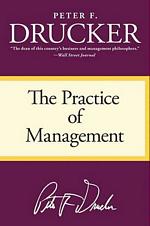 This classic is the first book to define management as a practice and a discipline, thus establishing Drucker as the founder of the discipline of modern management. Management has been practiced for centuries, but this book systematically defines management as a discipline that can be taught and learned. It provides a systematic guide for practicing managers who want to improve their effectiveness and productivity. It presents Management by Objectives as a genuine philosophy of management that integrates the interests of the corporation with those of the managers and contributors to an organization. Illustrations come from such companies as Ford, GE, Sears, Roebuck & Co., GM, IBM, and AT&T.
This classic is the first book to define management as a practice and a discipline, thus establishing Drucker as the founder of the discipline of modern management. Management has been practiced for centuries, but this book systematically defines management as a discipline that can be taught and learned. It provides a systematic guide for practicing managers who want to improve their effectiveness and productivity. It presents Management by Objectives as a genuine philosophy of management that integrates the interests of the corporation with those of the managers and contributors to an organization. Illustrations come from such companies as Ford, GE, Sears, Roebuck & Co., GM, IBM, and AT&T.
Buy “The Practice of Management” by Peter Drucker
“America’s Next Twenty Years” (1957)
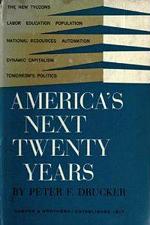 In this collection of essays, Peter Drucker discusses the issues that he believes will be significant in America, including the coming labor shortage, automation, significant wealth in the hands of a few individuals, college education, American politics, and perhaps most significantly, the growing disparity between the “haves” and the “have nots.” In these essays, Drucker identifies the major events that “have already happened” that will “determine the future.” “Identifying the future that has already happened” is a major theme of Drucker’s many books and essays.
In this collection of essays, Peter Drucker discusses the issues that he believes will be significant in America, including the coming labor shortage, automation, significant wealth in the hands of a few individuals, college education, American politics, and perhaps most significantly, the growing disparity between the “haves” and the “have nots.” In these essays, Drucker identifies the major events that “have already happened” that will “determine the future.” “Identifying the future that has already happened” is a major theme of Drucker’s many books and essays.
Buy “America’s Next Twenty Years” by Peter Drucker
“Landmarks of Tomorrow” (1957)
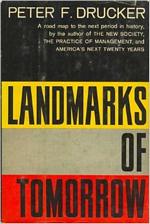 Landmarks of Tomorrow identifies “the future that has already happened” in three major areas of human life and experience. The first part of the book treats the philosophical shift from a Cartesian universe of mechanical cause to a new universe of pattern, purpose, and configuration. Drucker discusses the need to organize men of knowledge and of high skill for joint effort, and performance as a key component of this change. The second part of the book sketches four realities that challenge the people of the free world: an educated society, economic development, the decline of the effectiveness of government, and the collapse of Eastern culture. The final section of the book is concerned with the spiritual reality of human existence. These are seen as basic elements in late-twentieth-century society. In his new introduction, Peter Drucker revisits the main findings of Landmarks of Tomorrow and assesses their validity in relation to today’s concerns.
Landmarks of Tomorrow identifies “the future that has already happened” in three major areas of human life and experience. The first part of the book treats the philosophical shift from a Cartesian universe of mechanical cause to a new universe of pattern, purpose, and configuration. Drucker discusses the need to organize men of knowledge and of high skill for joint effort, and performance as a key component of this change. The second part of the book sketches four realities that challenge the people of the free world: an educated society, economic development, the decline of the effectiveness of government, and the collapse of Eastern culture. The final section of the book is concerned with the spiritual reality of human existence. These are seen as basic elements in late-twentieth-century society. In his new introduction, Peter Drucker revisits the main findings of Landmarks of Tomorrow and assesses their validity in relation to today’s concerns.
Buy “Landmarks of Tomorrow” by Peter Drucker
“Managing for Results” (1964)
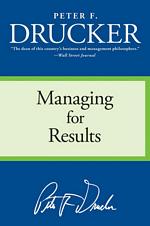 This book focuses upon economic performance as the specific function and contribution of business and the reason for its existence. The effective business, Peter Drucker observes, focuses on opportunities rather than problems. How this focus is achieved in order to make the organization prosper and grow is the subject of this companion to his classic, The Practice of Management. The earlier book was chiefly concerned with how management functions as a discipline and practice, this volume shows what the executive decision-maker must do to move his enterprise forward. One of the notable accomplishments of this book is its combining of specific economic analysis with the entrepreneurial force in business prosperity. For though it discusses “what to do” more than Drucker’s previous works, the book stresses the qualitative aspect of enterprise: every successful business requires a goal and spirit all its own. Managing for Results was the first book to describe what is now widely called “business strategy” and to identify what are now called an organization’s “core competencies.”
This book focuses upon economic performance as the specific function and contribution of business and the reason for its existence. The effective business, Peter Drucker observes, focuses on opportunities rather than problems. How this focus is achieved in order to make the organization prosper and grow is the subject of this companion to his classic, The Practice of Management. The earlier book was chiefly concerned with how management functions as a discipline and practice, this volume shows what the executive decision-maker must do to move his enterprise forward. One of the notable accomplishments of this book is its combining of specific economic analysis with the entrepreneurial force in business prosperity. For though it discusses “what to do” more than Drucker’s previous works, the book stresses the qualitative aspect of enterprise: every successful business requires a goal and spirit all its own. Managing for Results was the first book to describe what is now widely called “business strategy” and to identify what are now called an organization’s “core competencies.”
Buy “Managing for Results” by Peter Drucker
“The Effective Executive” (1966)
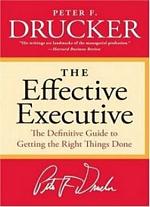 The Effective Executive is a landmark book that develops the specific practices of the executive that lead to effectiveness. It is based on observations of effective executives in business and government. Drucker starts by reminding executives that the measure of effectiveness is the ability to “get the right things done.” This involves five practices: (1) managing one’s time, (2) focusing on contribution rather than problems, (3) making strengths productive, (4) establishing priorities, and (5) making effective decisions. A major portion of the book is devoted to the process of making effective decisions and the criteria for effective decisions. Numerous examples are provided of executive effectiveness. The book concludes by emphasizing that effectiveness can be learned and must be learned.
The Effective Executive is a landmark book that develops the specific practices of the executive that lead to effectiveness. It is based on observations of effective executives in business and government. Drucker starts by reminding executives that the measure of effectiveness is the ability to “get the right things done.” This involves five practices: (1) managing one’s time, (2) focusing on contribution rather than problems, (3) making strengths productive, (4) establishing priorities, and (5) making effective decisions. A major portion of the book is devoted to the process of making effective decisions and the criteria for effective decisions. Numerous examples are provided of executive effectiveness. The book concludes by emphasizing that effectiveness can be learned and must be learned.
Buy “The Effective Executive” by Peter Drucker
“The Age of Discontinuity” (1968)
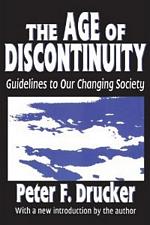 Peter Drucker focuses with great clarity and perception on the forces of change that are transforming the economic landscape and creating tomorrow’s society. He discerns four major areas of discontinuity underlying contemporary social and cultural reality: (I) the explosion of new technologies resulting in major new industries, (2) the change from an international to a world economy, (3) a new sociopolitical reality of pluralistic institutions that poses drastic political, philosophical, and spiritual challenges, and (4) the new universe of knowledge work based on mass education along with its implications. The Age of Discontinuity is a fascinating and important blueprint for shaping a future already very much with us.
Peter Drucker focuses with great clarity and perception on the forces of change that are transforming the economic landscape and creating tomorrow’s society. He discerns four major areas of discontinuity underlying contemporary social and cultural reality: (I) the explosion of new technologies resulting in major new industries, (2) the change from an international to a world economy, (3) a new sociopolitical reality of pluralistic institutions that poses drastic political, philosophical, and spiritual challenges, and (4) the new universe of knowledge work based on mass education along with its implications. The Age of Discontinuity is a fascinating and important blueprint for shaping a future already very much with us.
Buy “The Age of Discontinuity” by Peter Drucker
“Men, Ideas, and Politics” (1970)
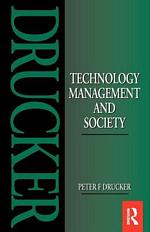 Technology, Management, and Society presents an overview of the nature of modern technology and its relationships with science, engineering, and religion. The social and political forces, which increasingly impinge on technological development, are analyzed within the framework of broad institutional change. Scholars and students troubled by society’s growing reliance on technological solutions to complex social and political problems will welcome Peter Drucker’s critical perspective.
Technology, Management, and Society presents an overview of the nature of modern technology and its relationships with science, engineering, and religion. The social and political forces, which increasingly impinge on technological development, are analyzed within the framework of broad institutional change. Scholars and students troubled by society’s growing reliance on technological solutions to complex social and political problems will welcome Peter Drucker’s critical perspective.
Buy “Men, Ideas, and Politics” by Peter Drucker
“Technology, Management, and Society” (1971)
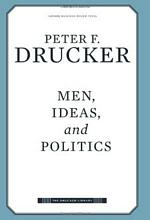 This book is a compilation of thirteen essays addressing the issues of society “people, politics, and thought. Included are essays on Henry Ford, Japanese management, and effective presidents. Two articles in particular show aspects of Drucker’s thinking that are especially important. One is an essay on “The Unfashionable Kierkegaard,” which encourages the development of the spiritual dimension of humankind. The other is on the political philosophy of John C. Calhoun, describing the basic principles of lsowo0 America’s pluralism and how they shape government policies and programs.
This book is a compilation of thirteen essays addressing the issues of society “people, politics, and thought. Included are essays on Henry Ford, Japanese management, and effective presidents. Two articles in particular show aspects of Drucker’s thinking that are especially important. One is an essay on “The Unfashionable Kierkegaard,” which encourages the development of the spiritual dimension of humankind. The other is on the political philosophy of John C. Calhoun, describing the basic principles of lsowo0 America’s pluralism and how they shape government policies and programs.
Buy “Technology, Management, and Society” by Peter Drucker
“Management: Tasks, Responsibilities, Practices” (1973)
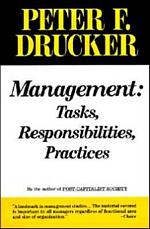 This book is a compendium of Drucker on management. It updates and expands upon The Practice of Management. It is an essential reference book for executives. Management is an organized body of knowledge consisting of managerial tasks, managerial work, managerial tools, managerial responsibilities, and the role of top management. According to Peter Drucker, “This book tries to equip the manager with the understanding, the thinking, the knowledge, and the skills for today’s and also tomorrow’s jobs.” This management classic has been developed and tested during more than thirty years of management teaching in universities, executive programs, seminars, and through the author’s close work with managers as a consultant for large and small businesses, government agencies, hospitals, and schools.
This book is a compendium of Drucker on management. It updates and expands upon The Practice of Management. It is an essential reference book for executives. Management is an organized body of knowledge consisting of managerial tasks, managerial work, managerial tools, managerial responsibilities, and the role of top management. According to Peter Drucker, “This book tries to equip the manager with the understanding, the thinking, the knowledge, and the skills for today’s and also tomorrow’s jobs.” This management classic has been developed and tested during more than thirty years of management teaching in universities, executive programs, seminars, and through the author’s close work with managers as a consultant for large and small businesses, government agencies, hospitals, and schools.
Buy “Management: Tasks, Responsibilities, Practices” by Peter Drucker
“The Pension Fund Revolution” (1976)
 In this book, Drucker describes how institutional investors, especially pension funds, have become the controlling owners of America’s large companies, and the country’s “capitalists.” He explores how ownership has become highly concentrated in the hands of large institutional investors, and that through the pension funds, “ownership of the means of production” has become “socialized” without becoming “nationalized.” Another theme of this book is the aging of America. Drucker points to the new challenges this trend will pose with respect to health care, pensions, and social security’s place in the American economy and society, and how, altogether, American politics would increasingly become dominated by middle-class issues and with the values of elderly people. In the new epilogue, Drucker discusses how the increasing dominance of pension funds represents one of the most startling power shifts in economic history, and examines their present-day impact.
In this book, Drucker describes how institutional investors, especially pension funds, have become the controlling owners of America’s large companies, and the country’s “capitalists.” He explores how ownership has become highly concentrated in the hands of large institutional investors, and that through the pension funds, “ownership of the means of production” has become “socialized” without becoming “nationalized.” Another theme of this book is the aging of America. Drucker points to the new challenges this trend will pose with respect to health care, pensions, and social security’s place in the American economy and society, and how, altogether, American politics would increasingly become dominated by middle-class issues and with the values of elderly people. In the new epilogue, Drucker discusses how the increasing dominance of pension funds represents one of the most startling power shifts in economic history, and examines their present-day impact.
Buy “The Pension Fund Revolution” by Peter Drucker
“Adventures of a Bystander” (1978)
 Adventures of a Bystander is Drucker’s collection of autobiographical stories and vignettes, in which he paints a portrait of his life, and of the larger historical realities of his time. Drucker conveys his life story “from his early teen years in Vienna through the interwar years in Europe, the New Deal era, World War II, and the postwar period in America” … “through intimate profiles of a host of fascinating people he’s known through the years. Along with bankers and courtesans, artists, aristocrats, prophets, and empire builders, we meet members of Drucker’s own family and close circle of friends, among them such prominent figures as Sigmund Freud, Henry Luce, Alfred Sloan, John Lewis, and Buckminster Fuller. Shedding light on a turbulent and important era, Adventures of a Bystander also reflects Peter Drucker himself as a man of imaginative sympathy and enormous interest in people, ideas, and history.
Adventures of a Bystander is Drucker’s collection of autobiographical stories and vignettes, in which he paints a portrait of his life, and of the larger historical realities of his time. Drucker conveys his life story “from his early teen years in Vienna through the interwar years in Europe, the New Deal era, World War II, and the postwar period in America” … “through intimate profiles of a host of fascinating people he’s known through the years. Along with bankers and courtesans, artists, aristocrats, prophets, and empire builders, we meet members of Drucker’s own family and close circle of friends, among them such prominent figures as Sigmund Freud, Henry Luce, Alfred Sloan, John Lewis, and Buckminster Fuller. Shedding light on a turbulent and important era, Adventures of a Bystander also reflects Peter Drucker himself as a man of imaginative sympathy and enormous interest in people, ideas, and history.
Buy “Adventures of a Bystander” by Peter Drucker
“Managing in Turbulent Times” (1980)
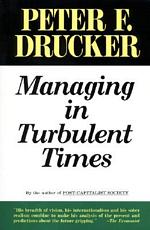 This important and timely book concerns the immediate future of business, society, and the economy. We are, says Drucker, entering a new economic era with new trends, new markets, a global economy, new technologies, and new institutions. How will managers and management deal with the turbulence created by these new realities? This book, as Drucker explains it, “is concerned with action, rather than understanding, with decisions, rather than analysis.” It deals with the strategies needed to adapt to change and to turn rapid changes into opportunities, to turn the threat of change into productive and profitable action that contributes positively to our society, the economy, and the individual. An organization must be structured to withstand a blow caused by environmental turbulence.
This important and timely book concerns the immediate future of business, society, and the economy. We are, says Drucker, entering a new economic era with new trends, new markets, a global economy, new technologies, and new institutions. How will managers and management deal with the turbulence created by these new realities? This book, as Drucker explains it, “is concerned with action, rather than understanding, with decisions, rather than analysis.” It deals with the strategies needed to adapt to change and to turn rapid changes into opportunities, to turn the threat of change into productive and profitable action that contributes positively to our society, the economy, and the individual. An organization must be structured to withstand a blow caused by environmental turbulence.
Buy “Managing in Turbulent Times” by Peter Drucker
“Toward the Next Economics” (1981)
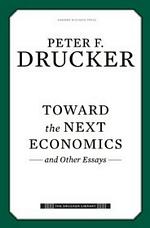 These essays cover a wide-ranging collection of topics on business, management, economics, and society. They are all concerned with what Drucker calls “social ecology” and especially with institutions. These essays reflect ‘the future that has already happened.”, The essays reflect Drucker’s belief that, in the decade of the 1970s, there were genuine changes in population structure and dynamics, changes in the role of institutions, changes in the relation between sciences and society, and changes in the fundamental theories about economics and society, long considered as truths. The essays are international in scope.
These essays cover a wide-ranging collection of topics on business, management, economics, and society. They are all concerned with what Drucker calls “social ecology” and especially with institutions. These essays reflect ‘the future that has already happened.”, The essays reflect Drucker’s belief that, in the decade of the 1970s, there were genuine changes in population structure and dynamics, changes in the role of institutions, changes in the relation between sciences and society, and changes in the fundamental theories about economics and society, long considered as truths. The essays are international in scope.
Buy “Toward the Next Economics” by Peter Drucker
“The Changing World of the Executive” (1982)
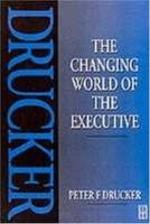 These essays from the Wall Street Journal explore a wide variety of topics. They deal with changes in the workforce “its jobs, its expectations” with the power relationships of a “society of employees,” and with changes in technology and in the world economy. They discuss the problems and challenges facing major institutions, including business enterprises, schools, hospitals, and government agencies. They look anew at the tasks and work of executives, at their performance and its measurement, and at executive compensation. However diverse the topics, these chapters have one common theme, the changing world of the executive “changing rapidly within the organization, changing rapidly with respect to the visions, aspirations, and even characteristics of employees, customers, and constituents, changing outside the organization, as well, economically, technologically, socially, politically.
These essays from the Wall Street Journal explore a wide variety of topics. They deal with changes in the workforce “its jobs, its expectations” with the power relationships of a “society of employees,” and with changes in technology and in the world economy. They discuss the problems and challenges facing major institutions, including business enterprises, schools, hospitals, and government agencies. They look anew at the tasks and work of executives, at their performance and its measurement, and at executive compensation. However diverse the topics, these chapters have one common theme, the changing world of the executive “changing rapidly within the organization, changing rapidly with respect to the visions, aspirations, and even characteristics of employees, customers, and constituents, changing outside the organization, as well, economically, technologically, socially, politically.
Buy “The Changing World of the Executive” by Peter Drucker
“Innovation and Entrepreneurship” (1985)
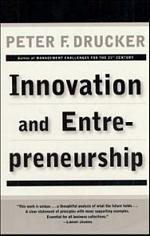 The first book to present innovation and entrepreneurship as a purposeful and systematic discipline. It explains and analyzes the challenges and opportunities presented by the emergence of the entrepreneurial economy in business and public service institutions. It is a major contribution to functioning management, organization, and economy. The book is divided into three main sections: (1) The Practice of Innovation, (2) The Practice of Entrepreneurship, and (3) Entrepreneurial Strategies. Drucker presents innovation and entrepreneurship as both practice and discipline, choosing to focus on the actions of the entrepreneur as opposed to entrepreneurial psychology and temperament. All organizations, including public-service institutions, must become entrepreneurial to survive and prosper in a market economy. The book provides a description of entrepreneurial policies and windows of opportunity for developing innovative practices in both emerging and well-established organizations.
The first book to present innovation and entrepreneurship as a purposeful and systematic discipline. It explains and analyzes the challenges and opportunities presented by the emergence of the entrepreneurial economy in business and public service institutions. It is a major contribution to functioning management, organization, and economy. The book is divided into three main sections: (1) The Practice of Innovation, (2) The Practice of Entrepreneurship, and (3) Entrepreneurial Strategies. Drucker presents innovation and entrepreneurship as both practice and discipline, choosing to focus on the actions of the entrepreneur as opposed to entrepreneurial psychology and temperament. All organizations, including public-service institutions, must become entrepreneurial to survive and prosper in a market economy. The book provides a description of entrepreneurial policies and windows of opportunity for developing innovative practices in both emerging and well-established organizations.
Buy “Innovation and Entrepreneurship” by Peter Drucker
“The Frontiers of Management” (1986)
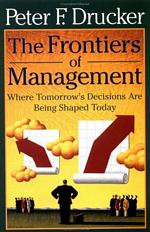 This book is a collection of thirty-five previously published articles and essays, twenty-five of which have appeared on the editorial page of the Wall Street Journal. Featuring a new introduction, Drucker forecasts the business trends of what was then the next millennium. The Frontiers of Management is a clear, direct, lively, and comprehensible examination of global trends and management practices. There are chapters dealing with the world economy, hostile takeovers, and the unexpected problems of success. Jobs, younger people, and career gridlock are also covered. Throughout this book, Drucker stresses the importance of forethought and of realizing that “change is opportunity” in every branch of executive decision-making.
This book is a collection of thirty-five previously published articles and essays, twenty-five of which have appeared on the editorial page of the Wall Street Journal. Featuring a new introduction, Drucker forecasts the business trends of what was then the next millennium. The Frontiers of Management is a clear, direct, lively, and comprehensible examination of global trends and management practices. There are chapters dealing with the world economy, hostile takeovers, and the unexpected problems of success. Jobs, younger people, and career gridlock are also covered. Throughout this book, Drucker stresses the importance of forethought and of realizing that “change is opportunity” in every branch of executive decision-making.
Buy “The Frontiers of Management” by Peter Drucker
“The New Realities” (1989)
 This book is about the “next century.” Its thesis is that the “next century” is already here, indeed that we are well advanced into it. In this book, Drucker writes about the “social superstructure” politics and government, society, economy and economics, social organization, and the new knowledge society. He describes the limits of government and dangers of “charisma” in leadership. He identifies the future organization as being information-based. While this book is not “futurism,” it attempts to define the concerns, the issues, and the controversies that will be realities for years to come. Drucker focuses on what to do today in contemplation of tomorrow. Within self-imposed limitations, he attempts to set the agenda on how to deal with some of the toughest problems we are facing today that have been created by the successes of the past.
This book is about the “next century.” Its thesis is that the “next century” is already here, indeed that we are well advanced into it. In this book, Drucker writes about the “social superstructure” politics and government, society, economy and economics, social organization, and the new knowledge society. He describes the limits of government and dangers of “charisma” in leadership. He identifies the future organization as being information-based. While this book is not “futurism,” it attempts to define the concerns, the issues, and the controversies that will be realities for years to come. Drucker focuses on what to do today in contemplation of tomorrow. Within self-imposed limitations, he attempts to set the agenda on how to deal with some of the toughest problems we are facing today that have been created by the successes of the past.
Buy “The New Realities” by Peter Drucker
“Managing the Non-Profit Organization” (1990)
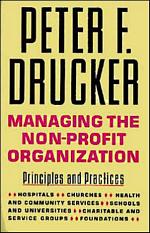 The service, or nonprofit, sector of our society is growing rapidly (with more than 8 million employees and more than 80 million volunteers), creating a major need for guidelines and expert advice on how to lead and manage these organizations effectively. This book is an application of Drucker’s perspective on management to nonprofit organizations of all kinds. He gives examples and explanations of mission, leadership, resources, marketing, goals, people development, decision-making, and much more. Included are interviews with nine experts that address key issues in the nonprofit sector.
The service, or nonprofit, sector of our society is growing rapidly (with more than 8 million employees and more than 80 million volunteers), creating a major need for guidelines and expert advice on how to lead and manage these organizations effectively. This book is an application of Drucker’s perspective on management to nonprofit organizations of all kinds. He gives examples and explanations of mission, leadership, resources, marketing, goals, people development, decision-making, and much more. Included are interviews with nine experts that address key issues in the nonprofit sector.
Buy “Managing the Non-Profit Organization” by Peter Drucker
“Managing for the Future” (1992)
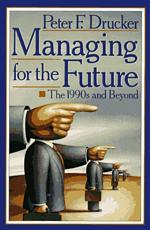 Bringing together the most exciting of Drucker’s many recent essays on economics, business practices, managing for change, and the evolving shape of the modern corporation, Managing for the Future offers important insights and lessons for anyone trying to stay ahead of today’s unremitting competition. Drucker’s universe is a constantly expanding cosmos composed of four regions in which he demonstrates mastery: (1) the economic forces affecting our lives and livelihoods, (2) today’s changing workforce and workplaces, (3) the newest management concepts and practices, and (4) the shape of the organization, including the corporation, as it evolves and responds to ever-increasing tasks and responsibilities. Each of this book’s chapters explores a business or corporate or “people” problem, and Drucker shows how to solve it or use it as an opportunity for change.
Bringing together the most exciting of Drucker’s many recent essays on economics, business practices, managing for change, and the evolving shape of the modern corporation, Managing for the Future offers important insights and lessons for anyone trying to stay ahead of today’s unremitting competition. Drucker’s universe is a constantly expanding cosmos composed of four regions in which he demonstrates mastery: (1) the economic forces affecting our lives and livelihoods, (2) today’s changing workforce and workplaces, (3) the newest management concepts and practices, and (4) the shape of the organization, including the corporation, as it evolves and responds to ever-increasing tasks and responsibilities. Each of this book’s chapters explores a business or corporate or “people” problem, and Drucker shows how to solve it or use it as an opportunity for change.
Buy “Managing for the Future” by Peter Drucker
“The Ecological Vision” (1993)
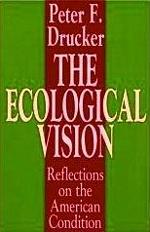 The thirty-one essays in this volume were written over a period of more than forty years. These essays range over a wide array of disciplines and subject matter. Yet they all have in common that they are “Essays in Social Ecology” and deal with the man-made environment. They all, in one way or another, deal with the interaction between individual and community. In addition, they try to look upon the economy, upon technology, upon art, as dimensions of social experience and as expressions of social values. The last essay in this collection, The Unfashionable Kierkegaard, was written as an affirmation of the existential, the spiritual, and the individual dimension of the Creature. It was written by Drucker to assert that society is not enough “not even for society. It was written to affirm hope. This is an important and perceptive volume of essays.
The thirty-one essays in this volume were written over a period of more than forty years. These essays range over a wide array of disciplines and subject matter. Yet they all have in common that they are “Essays in Social Ecology” and deal with the man-made environment. They all, in one way or another, deal with the interaction between individual and community. In addition, they try to look upon the economy, upon technology, upon art, as dimensions of social experience and as expressions of social values. The last essay in this collection, The Unfashionable Kierkegaard, was written as an affirmation of the existential, the spiritual, and the individual dimension of the Creature. It was written by Drucker to assert that society is not enough “not even for society. It was written to affirm hope. This is an important and perceptive volume of essays.
Buy “The Ecological Vision” by Peter Drucker
“Post-Capitalist Society” (1993)
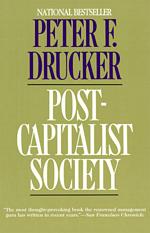 In Post-Capitalist Society, Peter Drucker describes how every few hundred years a sharp transformation has taken place and greatly affected society “its worldview, its basic values, its business and economics, and its social and political structure. According to Drucker, we are right in the middle of another time of radical change, from the Age of Capitalism and the Nation-State to a Knowledge Society and a Society of Organizations. The primary resource in the post-capitalist society will be knowledge, and the leading social groups will be “knowledge workers.” Looking backward and forward, Drucker discusses the Industrial Revolution, the Productivity Revolution, the Management Revolution, and the governance of corporations. He explains the new functions of organizations, the economics of knowledge, and productivity as a social and economic priority. He covers the transformation from Nation-State to Megastate, the new pluralism of political systems, and the needed turnaround in government. Finally, Drucker details the knowledge issues and the role and use of knowledge in the post-capitalist society. Divided into three parts “Society, Polity, and Knowledge” Post-Capitalist Society provides a searching look into the future as well as a vital analysis of the past, focusing on the challenges of the present transition period and how, if we can understand and respond to them, we can create a new future.
In Post-Capitalist Society, Peter Drucker describes how every few hundred years a sharp transformation has taken place and greatly affected society “its worldview, its basic values, its business and economics, and its social and political structure. According to Drucker, we are right in the middle of another time of radical change, from the Age of Capitalism and the Nation-State to a Knowledge Society and a Society of Organizations. The primary resource in the post-capitalist society will be knowledge, and the leading social groups will be “knowledge workers.” Looking backward and forward, Drucker discusses the Industrial Revolution, the Productivity Revolution, the Management Revolution, and the governance of corporations. He explains the new functions of organizations, the economics of knowledge, and productivity as a social and economic priority. He covers the transformation from Nation-State to Megastate, the new pluralism of political systems, and the needed turnaround in government. Finally, Drucker details the knowledge issues and the role and use of knowledge in the post-capitalist society. Divided into three parts “Society, Polity, and Knowledge” Post-Capitalist Society provides a searching look into the future as well as a vital analysis of the past, focusing on the challenges of the present transition period and how, if we can understand and respond to them, we can create a new future.
Buy “Post-Capitalist Society” by Peter Drucker
“Managing in a Time of Great Change” (1995)
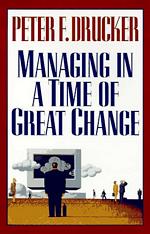 This book compiles essays written by Drucker from 1991 to 1994 and published in the Harvard Business Review and the Wall Street Journal. All of these essays are about change: changes in the economy, society, business, and in organizations in general. Drucker’s advice on how managers should adjust to these tectonic shifts centers on the rise of the now-ubiquitous knowledge worker and the global economy. In this book, Drucker illuminates the business challenges confronting us today. He examines current management trends and whether they really work, the implications for business in the reinvention of the government, and the shifting balance of power between management and labor.
This book compiles essays written by Drucker from 1991 to 1994 and published in the Harvard Business Review and the Wall Street Journal. All of these essays are about change: changes in the economy, society, business, and in organizations in general. Drucker’s advice on how managers should adjust to these tectonic shifts centers on the rise of the now-ubiquitous knowledge worker and the global economy. In this book, Drucker illuminates the business challenges confronting us today. He examines current management trends and whether they really work, the implications for business in the reinvention of the government, and the shifting balance of power between management and labor.
Buy “Managing in a Time of Great Change” by Peter Drucker
“Drucker on Asia” (1995) with Isao Nakauchi
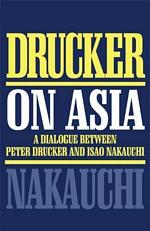 Drucker on Asia is the result of an extensive dialogue between two of the world’s leading business figures, Peter F. Drucker and Isao Nakauchi. Their dialogue considers the changes occurring in the economic world today and identifies the challenges that free markets and free enterprises now face, with specific reference to China and Japan. What do these changes mean to Japan? What does Japan have to do in order to achieve a “third economic miracle”? What do these changes mean to society, the individual company, the individual professional and executive? These are the questions that Drucker and Nakauchi address in their brilliant insight into the future economic role of Asia.
Drucker on Asia is the result of an extensive dialogue between two of the world’s leading business figures, Peter F. Drucker and Isao Nakauchi. Their dialogue considers the changes occurring in the economic world today and identifies the challenges that free markets and free enterprises now face, with specific reference to China and Japan. What do these changes mean to Japan? What does Japan have to do in order to achieve a “third economic miracle”? What do these changes mean to society, the individual company, the individual professional and executive? These are the questions that Drucker and Nakauchi address in their brilliant insight into the future economic role of Asia.
Buy “Drucker on Asia” by Peter Drucker
“Peter Drucker on the Profession of Management” (1996)
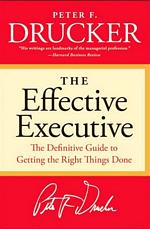 This is a significant collection of Peter Drucker’s landmark articles from the Harvard Business Review. Drucker seeks out, identifies, and examines the most important issues confronting managers, from corporate strategy to management style to social change. This volume provides a rare opportunity to trace the evolution of great shifts in our workplaces, and to understand more clearly the role of managers in the ongoing effort to balance change with continuity, the latter a recurring theme in Drucker’s writings. These are strategically presented here to address two unifying themes: the first examines the “Manager’s Responsibilities,” while the second investigates “The Executive’s World.” Containing an important interview with Drucker on “The Post-Capitalist Executive,” as well as a preface by Drucker himself, the volume is edited by Nan Stone, longtime editor of the Harvard Business Review.
This is a significant collection of Peter Drucker’s landmark articles from the Harvard Business Review. Drucker seeks out, identifies, and examines the most important issues confronting managers, from corporate strategy to management style to social change. This volume provides a rare opportunity to trace the evolution of great shifts in our workplaces, and to understand more clearly the role of managers in the ongoing effort to balance change with continuity, the latter a recurring theme in Drucker’s writings. These are strategically presented here to address two unifying themes: the first examines the “Manager’s Responsibilities,” while the second investigates “The Executive’s World.” Containing an important interview with Drucker on “The Post-Capitalist Executive,” as well as a preface by Drucker himself, the volume is edited by Nan Stone, longtime editor of the Harvard Business Review.
Buy “Peter Drucker on the Profession of Management” by Peter Drucker
“Management Challenges for the 21st Century” (1998)
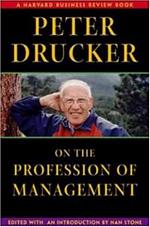 In this compilation of essays culled from published magazine articles and a lengthy essay appearing in The Economist in November 2001, and interviews during the period of 1996 to 2002, Drucker has expertly anticipated our ever-changing business society and ever-expanding management roles. In this book, Drucker identifies the reality of the ‘Next Society,” which has been shaped by three major trends: the decline of the young portion of the population, the decline of manufacturing, and the transformation of the workforce (together with the social impact of the Information Revolution). Drucker also asserts that e-commerce and e-learning are to the Information Revolution what the railroad was to the Industrial Revolution, and thus, an information society is developing. Drucker speaks of the importance of the social sector (that is, nongovernmental and nonprofit organizations), because NPOs can create what we now need: communities for citizens and especially for highly educated knowledge-workers, who increasingly dominate developed societies.
In this compilation of essays culled from published magazine articles and a lengthy essay appearing in The Economist in November 2001, and interviews during the period of 1996 to 2002, Drucker has expertly anticipated our ever-changing business society and ever-expanding management roles. In this book, Drucker identifies the reality of the ‘Next Society,” which has been shaped by three major trends: the decline of the young portion of the population, the decline of manufacturing, and the transformation of the workforce (together with the social impact of the Information Revolution). Drucker also asserts that e-commerce and e-learning are to the Information Revolution what the railroad was to the Industrial Revolution, and thus, an information society is developing. Drucker speaks of the importance of the social sector (that is, nongovernmental and nonprofit organizations), because NPOs can create what we now need: communities for citizens and especially for highly educated knowledge-workers, who increasingly dominate developed societies.
Buy “Management Challenges for the 21st Century” by Peter Drucker
“Managing in the Next Society” (1999)
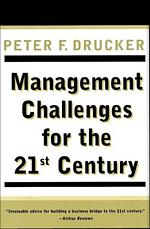 In his first major book since The Post-Capitalist Society, Drucker discusses the new paradigms of management “how they have changed and will continue to change our basic assumptions about the practices and principles of management. Drucker analyzes the new realities of strategy, shows how to be a leader in periods of change, and explains the “New Information Revolution,” discussing the information an executive needs and the information an executive owes. He also examines knowledge-worker productivity, and shows that changes in the basic attitude of individuals and organizations, as well as structural changes in work itself, are needed for increased productivity. Finally, Drucker addresses the ultimate challenge of managing oneself while meeting the demands on the individual during a longer working life and in an ever-changing workplace.
In his first major book since The Post-Capitalist Society, Drucker discusses the new paradigms of management “how they have changed and will continue to change our basic assumptions about the practices and principles of management. Drucker analyzes the new realities of strategy, shows how to be a leader in periods of change, and explains the “New Information Revolution,” discussing the information an executive needs and the information an executive owes. He also examines knowledge-worker productivity, and shows that changes in the basic attitude of individuals and organizations, as well as structural changes in work itself, are needed for increased productivity. Finally, Drucker addresses the ultimate challenge of managing oneself while meeting the demands on the individual during a longer working life and in an ever-changing workplace.
Buy “Managing in the Next Society” by Peter Drucker
“The Daily Drucker” (2002)
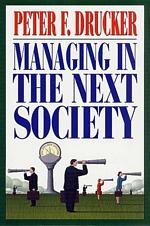 Revered management thinker Peter F. Drucker is our trusted guide in this thoughtful, day-by-day companion that offers his penetrating and practical wisdom. Amid the multiple pressures of our daily work lives, The Daily Drucker provides the inspiration and advice to meet the many challenges we face. With his trademark clarity, vision, and humanity, Drucker sets out his ideas on a broad swath of key topics, from time management, to innovation, to outsourcing, providing useful insights for each day of the year. These 366 daily readings have been harvested from Drucker’s lifetime of work. At the bottom of each page, the reader will find an action point that spells out exactly how to put Drucker’s ideas into practice. It is as if the wisest and most action-oriented management consultant in the world is in the room, offering his timeless gems of advice. The Daily Drucker is for anyone who seeks to understand and put to use Drucker’s powerful words and ideas.
Revered management thinker Peter F. Drucker is our trusted guide in this thoughtful, day-by-day companion that offers his penetrating and practical wisdom. Amid the multiple pressures of our daily work lives, The Daily Drucker provides the inspiration and advice to meet the many challenges we face. With his trademark clarity, vision, and humanity, Drucker sets out his ideas on a broad swath of key topics, from time management, to innovation, to outsourcing, providing useful insights for each day of the year. These 366 daily readings have been harvested from Drucker’s lifetime of work. At the bottom of each page, the reader will find an action point that spells out exactly how to put Drucker’s ideas into practice. It is as if the wisest and most action-oriented management consultant in the world is in the room, offering his timeless gems of advice. The Daily Drucker is for anyone who seeks to understand and put to use Drucker’s powerful words and ideas.
Buy “The Daily Drucker” by Peter Drucker
“The Effective Executive in Action” (2004)
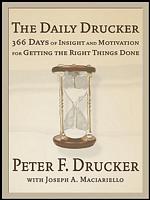 The Effective Executive in Action is a journal based on Peter F. Drucker’s classic and preeminent work on management and effectiveness “The Effective Executive“. Here Drucker and Maciariello provide executives, managers, and knowledge workers with a guide to effective action “the central theme of Drucker’s work. The authors take more than one hundred readings from Drucker’s classic work, update them, and provide provocative questions to ponder and actions to take in order to improve your own work. Also included in this journal is a space for you to record your thoughts for later review and reflection. “The Effective Executive in Action” will teach you how to be a better leader and how to lead according to the five main pillars of Drucker’s leadership philosophy.
The Effective Executive in Action is a journal based on Peter F. Drucker’s classic and preeminent work on management and effectiveness “The Effective Executive“. Here Drucker and Maciariello provide executives, managers, and knowledge workers with a guide to effective action “the central theme of Drucker’s work. The authors take more than one hundred readings from Drucker’s classic work, update them, and provide provocative questions to ponder and actions to take in order to improve your own work. Also included in this journal is a space for you to record your thoughts for later review and reflection. “The Effective Executive in Action” will teach you how to be a better leader and how to lead according to the five main pillars of Drucker’s leadership philosophy.
Buy “The Effective Executive in Action” by Peter Drucker
“Managing Oneself” (2007)
 We live in an age of unprecedented opportunity: with ambition, drive, and talent, you can rise to the top of your chosen profession regardless of where you started out. However, with opportunity comes responsibility. Companies today are not managing their knowledge workers’ careers. Instead, you must be your own chief executive officer. That means it is up to you to carve out your place in the world and know when to change course. In addition, it is up to you to keep yourself engaged and productive during a career that may span some 50 years. In Managing Oneself, Peter Drucker explains how to do it. The keys: Cultivate a deep understanding of yourself by identifying your most valuable strengths and most dangerous weaknesses. Articulate how you learn and work with others and what your most deeply held values are. Describe the type of work environment where you can make the greatest contribution. Only when you operate with a combination of your strengths and self-knowledge can you achieve true and lasting excellence. Managing Oneself identifies the probing questions you need to ask to gain the insights essential for taking charge of your career.
We live in an age of unprecedented opportunity: with ambition, drive, and talent, you can rise to the top of your chosen profession regardless of where you started out. However, with opportunity comes responsibility. Companies today are not managing their knowledge workers’ careers. Instead, you must be your own chief executive officer. That means it is up to you to carve out your place in the world and know when to change course. In addition, it is up to you to keep yourself engaged and productive during a career that may span some 50 years. In Managing Oneself, Peter Drucker explains how to do it. The keys: Cultivate a deep understanding of yourself by identifying your most valuable strengths and most dangerous weaknesses. Articulate how you learn and work with others and what your most deeply held values are. Describe the type of work environment where you can make the greatest contribution. Only when you operate with a combination of your strengths and self-knowledge can you achieve true and lasting excellence. Managing Oneself identifies the probing questions you need to ask to gain the insights essential for taking charge of your career.
Buy “Managing Oneself” by Peter Drucker
Anthologies by Peter Drucker
“The Essential Drucker” (2001)
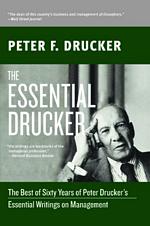 The Essential Drucker offers, in Drucker’s words, “a coherent and fairly comprehensive ‘Introduction to Management’ and gives an overview of my management work and thus answers the question I’ve been asked again and again: ‘Which writings is Essential?’ The book contains twenty-six selections on management in the organization, management and the individual, and management in society. It covers the basic principles and concerns of management and its problems, challenges, and opportunities, giving managers, executives, and professionals the tools to perform the tasks that the economy and society of today and tomorrow will demand of them.
The Essential Drucker offers, in Drucker’s words, “a coherent and fairly comprehensive ‘Introduction to Management’ and gives an overview of my management work and thus answers the question I’ve been asked again and again: ‘Which writings is Essential?’ The book contains twenty-six selections on management in the organization, management and the individual, and management in society. It covers the basic principles and concerns of management and its problems, challenges, and opportunities, giving managers, executives, and professionals the tools to perform the tasks that the economy and society of today and tomorrow will demand of them.
Buy “The Essential Drucker” by Peter Drucker
“A Functioning Society” (2003)
 In these essays, Drucker has brought together selections from his vast writings on community, society, and the political structure. Drucker’s primary concern is with a functioning society in which the individual has status and function. Parts I and II identify the institutions that could recreate community, the collapse of which produced totalitarianism in Europe. These selections were written during World War II. Part III deals with the limits of governmental competence in the social and economic realm. This section is concerned with the differences between big government and effective government.
In these essays, Drucker has brought together selections from his vast writings on community, society, and the political structure. Drucker’s primary concern is with a functioning society in which the individual has status and function. Parts I and II identify the institutions that could recreate community, the collapse of which produced totalitarianism in Europe. These selections were written during World War II. Part III deals with the limits of governmental competence in the social and economic realm. This section is concerned with the differences between big government and effective government.
Buy “A Functioning Society” by Peter Drucker
Novels by Peter Drucker
“The Last of All Possible Worlds” (1982)
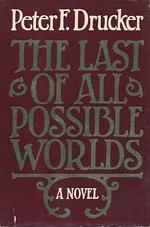 This novel occurs in the world of upper-class European society of the transitional age just before World War I. At the center of this novel are the lives of four distinguished Europeans who reach their later years around the turn-of-the-century.
This novel occurs in the world of upper-class European society of the transitional age just before World War I. At the center of this novel are the lives of four distinguished Europeans who reach their later years around the turn-of-the-century.
- The aristocratic Polish Prince Sobieski, a wealthy landowner, businessperson, and the Austro-Hungarian diplomat to Great Britain
- McGregor Hinton, a mathematics historian and an immensely successful banker, who faces an ethical crisis and reviews his life, his poor beginnings, his noble secret marriage to a prostitute after she bore his deformed child, and his brushes with aristocracy.
- A wealthy Jewish banker Julius von Mosenthal is planning a major restructuring of a bank while ruminating on the future meeting with partners Hinton and Sobieski
- Baroness Rafaela Wald-Reifnitz—descended from the purest Sephardic Jews, painted by two great artists, devoted to music, in love with her problematic husband Arthur.
Buy “The Last of All Possible Worlds” by Peter Drucker
“The Temptation to Do Good” (1984)
 “The Temptation to Do Good”, like “The Last of all Possible Worlds”, is outstanding and brilliant. They are very important additions to Peter Drucker’s outstanding and comprehensive picture of management thinking and practice. The Temptation to Do Good features Father Heinz Zimmerman, the President of a Catholic university. Father Zimmerman faces all of the leadership challenges common to nonprofit CEOs: budgets, donors, staff conflicts, board members, and ethical issues. If you’d add to the mix student and faculty and their expectations, you’ll come to appreciate the sense and purpose of an organization more.
“The Temptation to Do Good”, like “The Last of all Possible Worlds”, is outstanding and brilliant. They are very important additions to Peter Drucker’s outstanding and comprehensive picture of management thinking and practice. The Temptation to Do Good features Father Heinz Zimmerman, the President of a Catholic university. Father Zimmerman faces all of the leadership challenges common to nonprofit CEOs: budgets, donors, staff conflicts, board members, and ethical issues. If you’d add to the mix student and faculty and their expectations, you’ll come to appreciate the sense and purpose of an organization more.
Buy “The Temptation to Do Good” by Peter Drucker
Books Recommended by Morgan Stanley

Morgan Stanley recommends the following books to young employees, interns, and job candidates for their continued education of the financial industry.
History Tidbit: The Founding of Morgan Stanley
In 1933, the Glass-Steagall Act, and the broader U.S. Banking Act of 1933, mandated that commercial banking and investment banking operations could not function under a single holding entity. In response, the partners at J.P. Morgan & Co. led by Henry S. Morgan (grandson of the legendary J.P. Morgan) and Harold Stanley opened Morgan Stanley for business on 16-September -1935. Morgan Stanley currently has 60,000 employees in 1300 offices and operates in 42 countries.
Recommended Books on Legendary Investors and Personalities
.jpg) ‘Beating the Street’ by Peter Lynch, John Rothchild
‘Beating the Street’ by Peter Lynch, John Rothchild- ‘Market Wizards: Interviews with Top Traders’ by Jack D. Schwager
- ‘Damn Right: Behind the Scenes with Berkshire Hathaway Billionaire Charlie Munger’ by Janet Lowe
- ‘Den of Thieves’ by James B. Stewart
Recommended Books on “The Great Financial Houses”
.jpg) ‘Too Big to Fail’ by Andrew Ross Sorkin
‘Too Big to Fail’ by Andrew Ross Sorkin- ‘Greed and Glory on Wall Street: The Fall of House of Lehman’ by Ken Auletta
- ‘Liar’s Poker: Rising Through the Wreckage on Wall Street’ by Michael Lewis
- ‘The House of Morgan: An American Banking Dynasty and the Rise of Modern Finance’ by Ron Chernow
- ‘When Genius Failed: The Rise and Fall of Long-Term Capital Management’ by Roger Lowenstein
- ‘Morgan: American Financier’ by Jean Strouse
Recommended Books on Capital Markets, Financial Industry, and History
.jpg) ‘Fooled by Randomness: The Hidden Role of Chance in Life and in the Markets’ by Nassim Nicholas Taleb
‘Fooled by Randomness: The Hidden Role of Chance in Life and in the Markets’ by Nassim Nicholas Taleb- ‘The Practical Guide to Wall Street: Equities and Derivatives’ by Matthew Tagliani
- ‘The Predators’ Ball: The Inside Story of Drexel Burnham and the Rise of the Junk Bond Raiders’ by Connie Bruck
- ‘Secrets of the Temple – How the Federal Reserve Runs the Country’ by William Greider
- ‘Classics: An Investors Anthology’ by James R. Vertin, Charles D. Ellis
- ‘Security Analysis’ by Benjamin Graham and David Dodd
- ‘Margin of Safety: Risk-Averse Value Investing Strategies for the Thoughtful Investor’ by Seth A. Klarman
- ‘Reminiscences of a Stock Operator’ by Edwin Lefevre, Jon D. Markman, Paul Tudor Jones
- ‘Extraordinary Popular Delusions and the Madness of Crowds’ by Charles Mackay
- ‘Devil Take the Hindmost: A History of Financial Speculation’ by Edward Chancellor
- ‘Money Masters of Our Time’ by John Train
- ‘The Warren Buffett Way’ by Robert G. Hagstrom, Ken Fisher and Bill Miller
- ‘The Intelligent Investor’ by Benjamin Graham
Behavioral Interview Questions by Competency: Assertiveness

Assertiveness is the ability to maturely express one’s feelings and opinions in spite of disagreement; accurately communicate to others regardless of their status or position.
- Behavioral Interview Question: “Some of the best business ideas come from an individual’s ability to challenge others’ ways of thinking in a mature way. Tell me about a time when you were successful in challenging others’ ideas. What does this say about your ability to be assertive?”
Evaluating the candidate’s answer: Did the candidate honestly, persistently, and tactfully challenge the other person’s idea? Was there aggression/anger/abuse or withdrawal/dependency/ submissiveness? - Behavioral Interview Question: “It is realistic to say that no job is completely free of conflict. Tell me about a time when you were able to express your opinions maturely in spite of disagreements or objections.”
Evaluating the candidate’s answer: Did the candidate directly state an opinion without having been abusive/harsh/apologetic/defensive? Was there an emotional expression of an opinion or failure to express an opinion to avoid conflict? - Behavioral Interview Question: “Some situations require us to express ideas/opinions in a very tactful and careful way. Tell me about a time when you were successful with this particular skill.”
Evaluating the candidate’s answer: Did the candidate communicate with clarity and directness, and without evidence of negative feelings? Was there evidence or expression of negative feelings such as aggression or withdrawal, which interfered with effective communication? - Behavioral Interview Question: “Describe a time when you had to sell an idea to your boss, authority figure, or technical expert.”
Evaluating the candidate’s answer: Did the candidate make an honest, well-planned presentation including benefit statements, responses to objections, and guidance to a decision? Was there dislike for selling an idea, dishonesty/distortion, and/or either withdrawal/passivity or bragging/pressure? - Behavioral Interview Question: “Describe a time when you communicated something unpleasant or difficult to say to your manager or work team. How did you assert yourself?”
Evaluating the candidate’s answer: Did the candidate accurately and tactfully express a fact/opinion on a sensitive/important issue? Was there avoidance of an issue, passive aggression, and/or an aggressive/tactless presentation? - Behavioral Interview Question: “Give me an example of a time when you had to be assertive in giving directions to others.”
Evaluating the candidate’s answer: Did the candidate give firm, clear direction, perhaps with concern for another’s feelings? Was there an emotional reaction such as anger or anxiety? - Behavioral Interview Question: “Tell me about a time when your job required you to say, maturely, how you really felt about a situation. What did you say and how did you say it?”
Evaluating the candidate’s answer: Did the candidate present a feeling honestly and tactfully? Was there a negative feeling such as anger/ fear/anxiety/depression that interfered with mature communications? - Behavioral Interview Question: “Sometimes it is important to disagree with others, particularly your boss or team members, in order to keep a mistake from being made. Tell me about a time when you were willing to disagree with another person in order to build a positive outcome.”
Evaluating the candidate’s answer: Did the candidate disagree tactfully and in a timely fashion, balancing the need to communicate an opinion/ information with respect? Was there avoidance of disagreement or a tactless presentation?